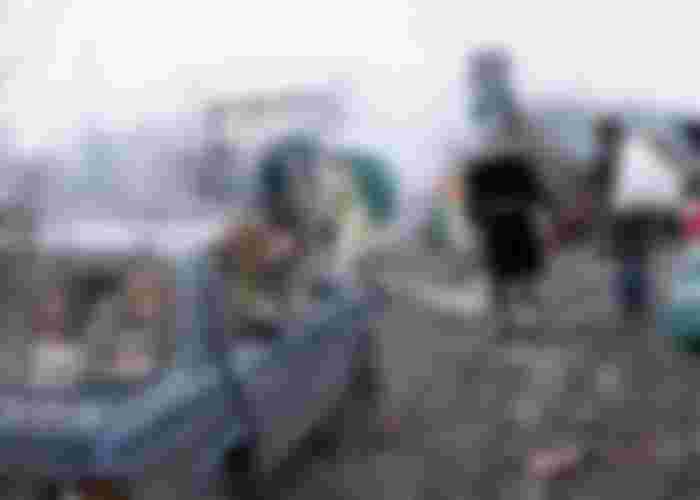A dystopia (from Ancient Greek δυσ- "bad" and τόπος "place"; alternatively cacotopia or simply anti-utopia) is a community or society that is undesirable or frightening. It is an antonym of utopia, a term that was coined by Sir Thomas More and figures as the title of his best known work, published in 1516, which created a blueprint for an ideal society with minimal crime, violence and poverty.
Dystopias are often characterized by dehumanization, tyrannical governments, environmental disaster, or other characteristics associated with a cataclysmic decline in society. Dystopian societies appear in many fictional works and artistic representations, particularly in stories set in the future. Some of the most famous examples are Aldous Huxley's Brave New World (1932), George Orwell's Nineteen Eighty-Four (1949), and Ray Bradbury's Fahrenheit 451 (1953). Dystopian societies appear in many sub-genres of fiction and are often used to draw attention to society, environment, politics, economics, religion, psychology, ethics, science or technology. Some authors use the term to refer to existing societies, many of which are, or have been, totalitarian states or societies in an advanced state of collapse.
Some scholars, such as Gregory Claeys and Lyman Tower Sargent, make certain distinctions between typical synonyms of dystopias. For example, Claeys and Sargent define literary dystopias as societies imagined as substantially worse than the society in which the author writes, whereas anti-utopias function as criticisms of attempts to implement various concepts of utopia. In Dystopia: A Natural History, Claeys offers a historical approach to these definitions. Here the tradition is traced from early reactions to the French Revolution. Its commonly anti-collectivist character is stressed, and the addition of other themes—the dangers of science and technology, of social inequality, of corporate dictatorship, of nuclear war—are also traced.
Etymology
Though several earlier usages are known, dystopia was used as an antonym for utopia by John Stuart Mill in one of his 1868 Parliamentary Speeches (Hansard Commons) by adding the prefix "dys" (Ancient Greek: δυσ- "bad") to "topia", reinterpreting the initial "u" as the prefix "eu" (Ancient Greek: ευ- "good") instead of "ou" (Ancient Greek: οὐ "not"). It was used to denounce the government's Irish land policy: "It is, perhaps, too complimentary to call them Utopians, they ought rather to be called dys-topians, or caco-topians. What is commonly called Utopian is something too good to be practicable; but what they appear to favour is too bad to be practicable".
Decades before the first documented use of the word "dystopia" was "cacotopia"/"kakotopia" (using Ancient Greek: κακόs, "bad, wicked") originally proposed in 1818 by Jeremy Bentham, "As a match for utopia (or the imagined seat of the best government) suppose a cacotopia (or the imagined seat of the worst government) discovered and described". Though dystopia became the most popular term, cacotopia finds occasional use; Anthony Burgess, author of A Clockwork Orange, said it was a better fit for Orwell's Nineteen Eighty-Four because "it sounds worse than dystopia".

Society
Dystopias typically reflect contemporary sociopolitical realities and extrapolate worst-case scenarios as warnings for necessary social change or caution. Dystopian fictions invariably reflect the concerns and fears of their creators' contemporaneous culture. Due to this, they can be considered a subject of social studies.[citation needed]
In a 1967 study, Frank Kermode suggests that the failure of religious prophecies led to a shift in how society apprehends this ancient mode. Christopher Schmidt notes that, while the world goes to waste for future generations, people distract themselves from disaster by passively watching it as entertainment.
In the 2010s, there was a surge of popular dystopian young adult literature and blockbuster films. Some have commented on this trend, saying that "it is easier to imagine the end of the world than it is to imagine the end of capitalism". Cultural theorist and critic Mark Fisher identified the phrase as encompassing the theory of capitalist realism ‐ the perceived "widespread sense that not only is capitalism the only viable political and economic system, but also that it is now impossible even to imagine a coherent alternative to it" - and used the above quote as the title to the opening chapter of his book, Capitalist Realism: Is There No Alternative?. In the book, he also refers to dystopian film such as Children of Men (originally a novel by P. D. James) to illustrate what he describes as the "slow cancellation of the future". Theo James, an actor in Divergent, explains that "young people in particular have such a fascination with this kind of story [...] It's becoming part of the consciousness. You grow up in a world where it's part of the conversation all the time – the statistics of our planet warming up. The environment is changing. The weather is different. There are things that are very visceral and very obvious, and they make you question the future and how we will survive. It's so much a part of everyday life that young people inevitably – consciously or not – are questioning their futures and how the Earth will be. I certainly do. I wonder what kind of world my children's kids will live in.

Decades before the first documented use of the word "dystopia" was "cacotopia"/"kakotopia" (using Ancient Greek: κακόs, "bad, wicked") originally proposed in 1818 by Jeremy Bentham, "As a match for utopia (or the imagined seat of the best government)